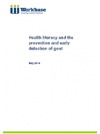A fairly good level of health literacy is needed to prevent or manage a long-term health condition such as gout. Health literacy is generally defined as the capacity to access, understand and use health information and services in order to make informed health decisions. The quality of practitioner communication and the user-friendliness of health services are also factors that influence health literacy.
This publication reports on a project that looked at effective approaches to strengthen health literacy in relation to the initial prevention and early detection of gout. Gout is a serious condition, but knowing the risk factors can help prevent it or recognise it early. It also helps to know that gout can be treated effectively with appropriate medication and other measures to prevent further attacks. Research has shown that these messages are generally not well communicated or understood.
The project focused mainly on Māori as a population group with a high incidence of gout compared with some other groups. Among other things, the report includes:
- findings from discussions with focus groups that included gout sufferers and their whānau, and with a range of health professionals
- recommendations for improving health literacy in relation to gout.
In response to the initial findings, 5 resources were developed during the project. The report and resources would be useful for a range of people, from those experiencing gout or at risk of developing it (and their whānau) to health professionals involved in the prevention or management of gout. The Ministry has published 2 of the resources (‘To Stop Gout’ booklet and ‘Are you at risk of gout?’ pamphlet) on the Gout page in the Your Health section.

